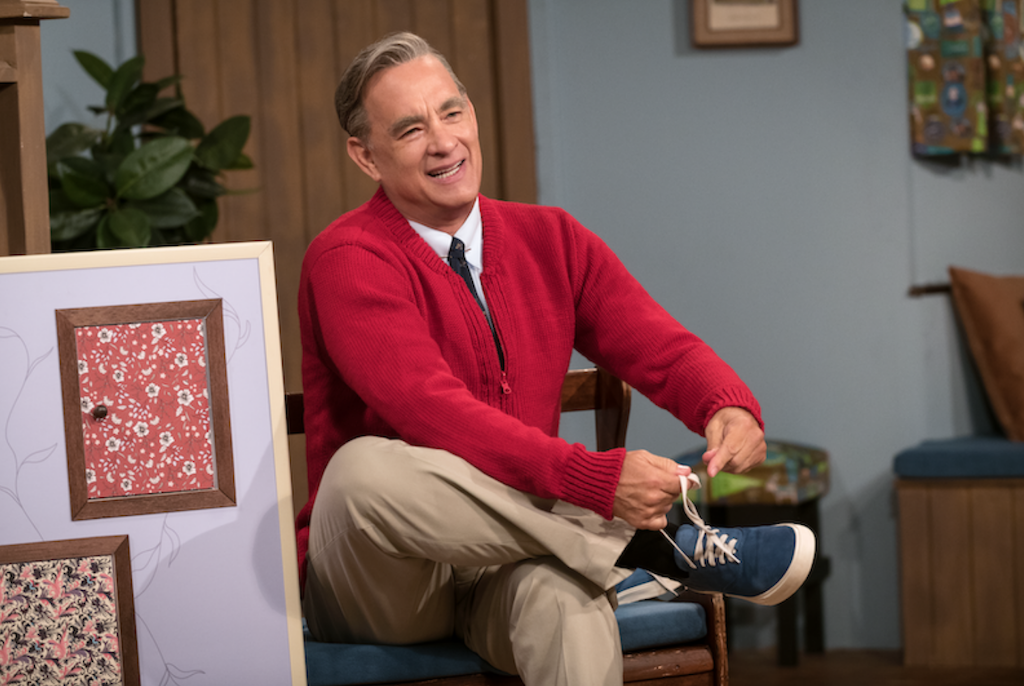
When I found out that Tom Hanks had been hired to play Mr. Rogers in the new film, A Beautiful Day in the Neighborhood, I marveled at the perfection of the casting. While Hanks doesn’t actually look much like the famous children’s TV star, he has something more important than superficial resemblance—like Rogers, he exudes decency, empathy, and compassion. Like Rogers, he makes being a good man look effortless.
Of course, being a good man was not effortless for Fred Rogers—he worked at it, every day—and that’s one of the themes of this often touching, occasionally frustrating film.
Matthew Rhys (of The Americans fame) plays Lloyd Vogel, a stand-in for famous Esquire journalist Tom Junod, who is assigned to write a story on Rogers for the magazine’s 1998 Heroes issue. (His editor is played by Christine Lahti, a laughable choice since, as far as I know, there has never been a female editor of Esquire). Vogel is going through some issues of his own—he is a new father, and having a hard time adjusting to the lifestyle change that represents—basically, he makes his attorney wife (Susan Kelechi Watson) do most of the work. He’s estranged from and still very angry at his own father (Chris Cooper), for reasons that will eventually come clear. He mopes around the house and office. In short, he’s a cynical, dark, wounded guy. Exactly the kind of guy Mr. Rogers loves, according to his manager.
So Vogel tromps off to Pittsburgh and gets to watch Mr. Rogers do his thing, including interacting with a child on set. At first, the child is unruly and his sheepish parents keep apologizing for his bad behavior. But Mr. Rogers keeps addressing the boy in that calm, steady voice of us—asking him questions, engaging him, until the boy envelops Rogers in a hug.
Vogel, watching from the sidelines, is both impressed and skeptical. He wonders if Rogers is full of shit. He must be, right? No one could possibly be that decent.
The best parts of A Beautiful Day in the Neighborhood are the scenes between Vogel and Rogers, especially their interviews. Vogel keeps trying to get Rogers to open up, but he’s clearly not comfortable talking about himself. Oftentimes, Rogers will acknowledge the sensitivity or insightfulness of the question, without actually answering it. Even more frequently, he’ll turn around the question and try to get Vogel to share things with him—about being a father, about his own father, about his childhood.
Vogel is slightly annoyed by this—but resistance is futile. When Mr. Rogers stares at you with those limpid, caring eyes, you eventually spill your guts.
What I like about this is that it serves two purposes: It shows how Rogers’ genuine empathy has a soothing effect. But it also demonstrates that Rogers was likely a pain in the ass to interview.
I can’t say enough about Hanks’ performance here. I read Taffy Brodesser-Akner’s interview with Hanks in The New York Times, where he repeatedly reminds us that he is not Rogers, he’s very much acting. Indeed. To play Rogers, Hanks slows down his voice and affect. There was a stillness, a minimalism to Rogers’ bearing that Hanks captures perfectly. He also absolutely nails the way Rogers conducted himself on air—staring at the camera, as he explained, as though he were looking into the eyes of one particular child.
What I’m about to say might be a little controversial, but I also think Hanks captures the fact that there was something a little creepy, or at least uncanny, about Rogers: a brilliant adult who nonetheless behaved in a child-like way, who feigned guilelessness, who spent all of his public life physically caring. If nothing else, Rogers’ placid, attentive presence was a little unnerving—and Rhys does a great job of showing how Vogel tried, and mostly failed, to navigate it.
There are, however, a few things about the film I didn’t love. If you hadn’t told me that the director was a woman—Marielle Heller, responsible for the great The Diary of a Teenage Girl and one of my favorite films of last year, Can You Ever Forgive Me?—I would’ve assumed it was a guy. Because you see, Vogel is kind of a jerk. That’s fine, jerks are interesting subject matter. But everyone in the film is always propping him up, supporting him, loving him—including several women—when what he really needs is a swift kick in the ass. In that sense, the film comes dangerously close to the “great man” theory of bad behavior. Vogel is a brilliant writer, therefore, we are to put up with his pugilistic tendencies, his neglect of his wife and infant son, his all-consuming selfishness. Everyone, even Mr. Rogers (especially Mr. Rogers) works very hard to heal him.
My other gripe with the film is that it sags a bit when Rogers isn’t on screen. The film focuses a lot on the relationship between Vogel and his father, Jerry, and, frankly, I just didn’t care about them, at least partly because the Jerry Vogel character is written so broadly (the first time we meet him, he’s at a wedding and drunk). He never seems to have an interesting interior life.
Still, for a film that I occasionally resisted, A Beautiful Day in the Neighborhood sure made me cry a lot. That scene on the subway in the trailer when the kids sing to Mr. Rogers? It’s even longer and more moving than I expected. And then there’s a final gesture—a bit of sign language that Rogers taught Vogel—that wrecked me. Apparently, it’s not just Lloyd Vogel who needs a little Mr. Rogers in his life. I do, too.
